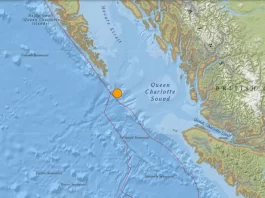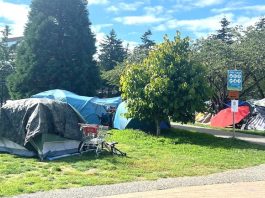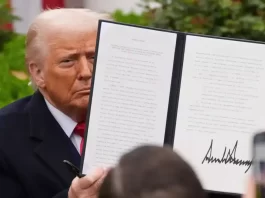Interviewed by Katie Stobbart.
Since many students will be voting for the first time, what would you describe as the role of municipal politics? What can city councillors actually do?
Well, first and foremost the Municipal Act and the City Charter are a product of provincial legislation. So there are limited roles — the main function, of course, is [governing] water, sewer, roads, policing, fire protection (so, safety issues), zoning and community planning (so where industrial, commercial, and residential [areas] go). So, limited powers: they’re very concise and outlined, again, by provincial legislation.
The level of government that affects us most on a day-to-day basis is municipal — its not as glamourous of course because you’re not dealing with international trade and the military and those types of things but we’re the ones who are affecting your transportation and infrastructure for your water and policing.
Who do you view as your constituents?
Anybody that lives in Abbotsford. Not just taxpayers, because people that are renting are also contributing to the tax base. My business is downtown, so I guess I have a little bit of a broader perspective, but people who choose to visit Abbotsford, shop in Abbotsford, folks that are here but aren’t necessarily contributing to the tax base because they are homeless — they’re still our responsibility, I think. So anybody that chooses to make Abbotsford their home.
How will you receive the views of the entire population instead of just those most active around City Hall?
Well, various [ways]. I’m on the board at Community Services [and] we offer 80 different programs from new immigrants to new mums (so, childcare issues) and seniors (meals on wheels). I think that sort of gives me a broad perspective, and [so does] my business — an automotive repair shop my family’s owned for 60 years — people who I do business with on a daily basis, I get a really broad perspective of people in that regard.
Are you doing anything to address the lack of student interest in municipal politics?
I’ve always maintained that young people have a say and should have a say at the council table. There’s a couple of UFV students that are running — I have the distinction of being the youngest one ever elected; I was elected when I was 23 and I had been attending UFV (Fraser Valley College at the time). Twenty per cent of the population actually shows up to vote, so I think it’s a societal thing — there’s a lot of apathy and students probably feel their voice isn’t being heard, that they don’t have a voice, that “Oh, they’re just going to do what they want anyways.” It’s been an age-old problem, it was when I was a student — I was involved but most of my friends thought I was crazy and they probably still do.
Social media again is a big one and I think all the candidates are trying to engage social media more. Having a student-led all candidates meeting would have been a wise move, but it’s a little late for that now.
I think at the council level if I do happen to get in I would love to see more collaboration with the university. [For example], we’ve got huge development potential in the downtown core with the Clayburn industry moving out —I’d love to see UFV having a presence down there, maybe for their urban planning. There are things that council can do to engage the student body a little bit more too.
Why did you choose to run on a slate, and what do you think this means for the organization of municipal politics?
I don’t think it changes anything. Abbotsford First makes recommendations, so each council member or candidate is free to vote their conscience … basically they’ve endorsed people they believe have their values at stake as far as [Abbotsford being an] economic hub. It means you’ve got a common focus on some key issues. So I view that as a positive — one of the reasons I decided to go with a team is because no one person has the gifts or the abilities, the time or energy to do the job justice — and that’s why we have eight councillors. In the past we’ve always elected people from varying backgrounds — but it was [about] name recognition. What we’re doing is basically making nomination suggestions for people who are like-minded on key issues. It’s not party politics in the way you would look at, say, provincial [politics]. If I don’t vote a certain way, I don’t get kicked out of the party; we just agree to disagree. I guess more importantly, behind the scenes we’ve been working on policy and can hit the ground running putting policy in place.
If you were elected, how would what you want to do as a councillor be different than what council is already doing?
I think one of the main reasons I’m getting back involved is my role on Community Services; I got involved more from the perspective of trying to help the homeless and moving some of those issues forward, and I was a little surprised at how little they knew about what Community Services was doing, so that kind of piqued my interest in why don’t they know more. I’m running with a group of people, and I like to look at it as more of a team [than a slate], and I think our main focus is to make Abbotsford the economic hub that it could be; we’re the geographic hub of the Fraser Valley and we have the potential to be the economic hub. Abbotsford has shifted from a medium-sized city in the country to an economic hub or large city that has big city problems we need to address from more of a team approach; so I think a good governance model looks at it more as board of directors that gives clear concise policy; I view it as a transition stage, going from a small town to a big city in one leap.
We need to engage in stronger partnerships with Fraser Health and BC Housing to help with the homeless issue — because really the homeless issue is a provincial funding issue. I guess when you ask how would we do things different: I think it would be stronger partnerships with senior levels of government and a governance model that looks at it as a board of directors and focuses on issues they have control over.
Do you have a specific project you want to prioritize or bylaw you want to change?
Economic development would be the area I’d like us to focus on because everything else spins out from that. We’ve got the agri-industry, the ability to grow a product, add value to that product, and transport it. We’ve got so much potential here and I think it just needs stronger partnerships and realizing it and helping grow that … sitting down with industry, finding out what their needs are, and working with the land commission. A lot of times you’ll have accessory industry that complements — so where does that get positioned? Food processing plants: that’s a huge industry. Do we need to take a look at some industrial-agriculture mix as far as taxation? We’ll have processing plants on industrial land paying quite a bit higher taxation, yet they’re seasonal — half the year they’re not even being used. We’re making a huge shift from dairy; a lot of our dairy industry has left the valley, so our historic way of looking at agriculture is starting to change. We need to take a serious look at industry to see how we keep those jobs here, because those are value-added jobs. But then that also leads one to think, if they’re only working part of the year, then we’ve got an unemployment issue, which skews our unemployment numbers, which also affects us when we’re trying to sell Abbotsford as an economic hub. So it gets a little complicated but it’s all interrelated.
This interview has been edited for length and clarity.



